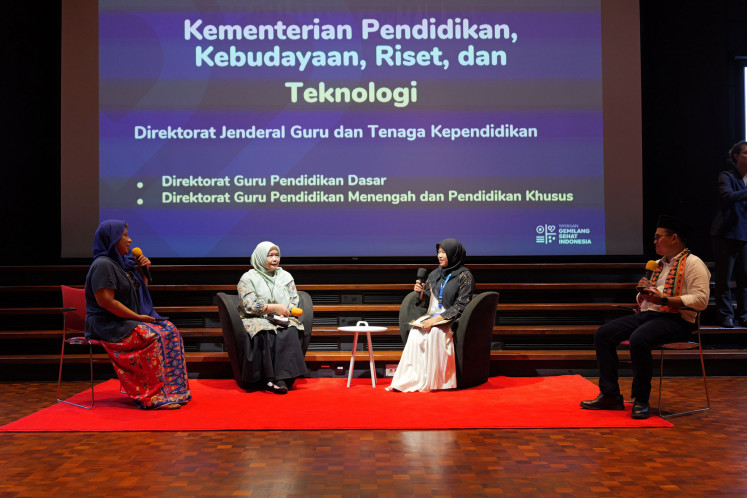Squabbling over 'Bumi Manusia' film shows low literacy
Change Size
 An exhibition titled "Namaku Pram: Catatan dan Arsip" (My Name is Pram: Notes and Archives), referring to the name Pramoedya, as he was commonly known by, was held at Dia.Lo.Gue in Kemang, South Jakarta. (JP/Devina Heriyanto)
An exhibition titled "Namaku Pram: Catatan dan Arsip" (My Name is Pram: Notes and Archives), referring to the name Pramoedya, as he was commonly known by, was held at Dia.Lo.Gue in Kemang, South Jakarta. (JP/Devina Heriyanto)
T
he problematic plan to adapt the famous novel Bumi Manusia (Earth of Mankind) into a film and the ensuing arguments actually show how low Indonesians’ literacy can drop.
I do not mean simply the ability to write and read, but the ability to digest the writer’s/speaker’s intention imbued in the information we consume.
One part of understanding what Pramoedya Ananta Toer’s novel talks about is indeed the tragic love story between the main characters, Minke and Annelies. However, that is not all there is.
Understanding other parts of Bumi Manusia include: that Annelies’ separation from Minke depicts the powerlessness of the colonized people as the oppressed in the face of the law, imposed on them by the oppressor; that Minke’s shift from a spoiled writer who initially only wanted his writing to be appreciated by the upper-class oppressors, to a nationalist writer who wanted his works to inspire his fellow brothers and sisters is a call for nationalism and social movement; how Nyai Ontosoroh’s out-of-her-time, courageous independence from her rotten husband is a call for freedom, resistance and equality.
In fact, the more one reads the book — hopefully followed by others in the trilogy — the more one will find ideas to discuss, interpret and argue about. After all, Bumi Manusia is a reputable literary work, not only nationally but globally, leading to a number of nominations of Pramoedya for the Nobel literary prize.
His messages resonate with many different readers from around the world, especially those who struggle and fight for the same causes portrayed in the novel. This is why Bumi Manusia is not a pop novel, and its adaptation to the screen should be more than just pop entertainment.
As a fan of Pramoedya’s work, I surely hope to see this precious book adapted to the big screen. Fingers crossed, as I will not judge the quality of director Hanung Bramantyo’s work before it is completed. Nonetheless, I definitely expect that Hanung has a full grasp of what Bumi Manusia truly contains while trying to adapt it into a movie.
Castrating Bumi Manusia to a mere additional tragic love story would not do justice to the deep and rich original material.
In her defense of the planned film adaptation, Novia Riani Putri dismissed people’s concerns that a sloppy movie adaptation would ruin their imagination. She argued that a movie adaptation as a new entity would never harm the original material nor the author, and said Bumi Manusia could be popular among Indonesian youths who otherwise might not even bother to pick up the book.
Comparing the case to other foreign classics, she said nobody “would actually bother to read a classic and thick novel of other countries with old-language style” as “even the native speakers [of those works] mostly read them as part of a high school task”, nothing more and nothing less.
Read also: 'Bumi Manusia' simplified to lure millennial generation
I do feel glad that such a movie adaptation would stimulate the youths' curiosity to read classics or even to read at all. More and more people will get to know Pramoedya’s works too.
For with low literacy, Ahmad Tohari’s Ronggeng Dukuh Paruk (Dancer of Paruk Village) would only mean a story of an erotic dancer, Umar Kayam’s Para Priyayi (The Nobility) would be nothing more than a family drama and Achdiat Karta Mihardja’s Atheis would be merely another tragic love story. (mut)
***
The writer is an Indonesian lecturer at Guangdong University of Foreign Studies, Guangzhou, China. He graduated with a masters degree in international educational development, Teachers College, Columbia University, New York, the United States.









